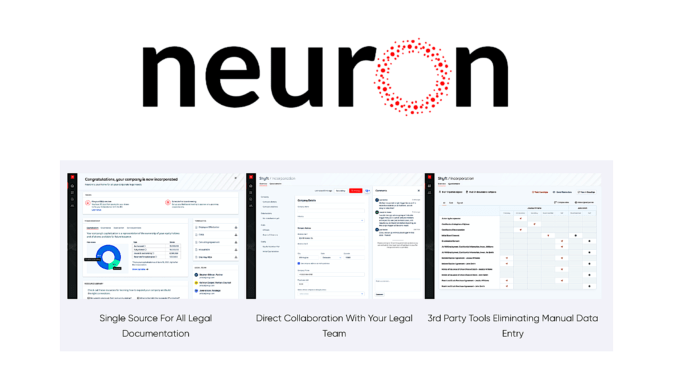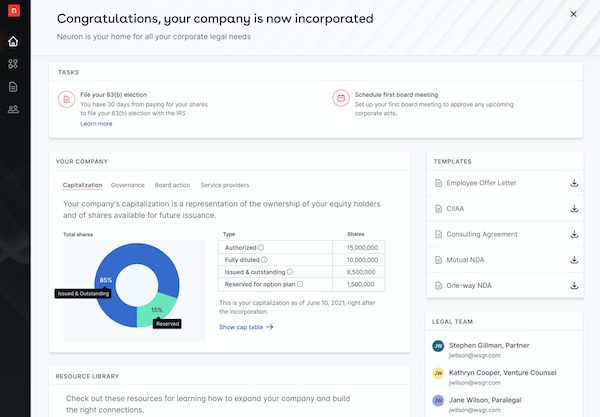
Leading tech-focused law firm, Wilson Sonsini Goodrich & Rosati, has launched a new service called Neuron aimed at helping startup companies. The digital platform allows startups to create key documents and collaborate easily with the firm’s lawyers.
The suite of capabilities, which are part of the West Coast-based firm’s Emerging Companies Practice (ECP), is designed to help startups with ‘streamlining, automating, and digitising’ the core legal steps around company formation, ownership issues, and even company exit.
For example, there are dedicated modules for incorporation, capitalisation management, corporate maintenance, and financing. Startup clients who join the platform will also get ‘a single-view digital home‘ to access and manage their legal information and documentation at any time. Startups can also collaborate directly with their ECP legal team on one integrated platform, said the firm.

No doubt this move will help the law firm, which is based in California, to onboard young companies, of which some will go on to become the Ubers and eBays of tomorrow. I.e. it builds a pipeline of potentially much larger clients who will in the future need help with funding rounds, M&A, and even IPOs.
And, one could add that if you want to be a law firm that appeals to the young founders of pioneering new companies, then offering a suite of tools that can get your core legal needs quickly sorted out, all in a digital-first way, makes a lot of sense. I.e. talk the innovation talk, and then walk the innovation walk, and also win over this segment of the market.
The move is a bit similar to what Clifford Chance has done recently in Singapore, where it has created a suite of automated documents to help local startups through its VIMA solutions project.
Raj Judge, Senior Partner at Wilson Sonsini and ECP Co-Chair, said in a statement: ‘Neuron is our next paradigm leap in transforming the legal industry. Having advised hundreds of thousands of start-ups, our ECP attorneys know what entrepreneurs need to succeed. We have combined Wilson Sonsini’s world-class legal expertise with automation to deliver high quality, responsive and efficient technology-enabled legal services to our clients.’
Artificial Lawyer interviewed David Wang, Wilson Sonsini Chief Innovation Officer, in detail about the launch. Please see below:

– Will this be primarily using templates and doc automation (e.g. to help with corporate docs for startups?)
The concept of Neuron is to be a ‘neuron’, if you will, that acts as a smart connector between the different elements of the client’s digital legal experience, as well as between the client and attorney. While Neuron will include document automation, this is a relatively small part of the platform.
Each module in the Neuron platform will co-exist with a legal service we perform for a client on a startup’s journey, from incorporation to exit, and be a digital legal home for the client. We will be introducing additional ‘Neurons’ at a regular tempo from this point forward, and these Neurons will speak to each other and work together, just like neurons do in the body.
Just providing automated templates is a more commoditised volume business, which works well for certain scenarios, but digitally transforming one of our core, premium services is far more complex and challenging.
This transformation involves tying together the entire process of data collection, client interactions, document preparation, process management, signatures, record creation, etc. in a digital experience, while having a Wilson Sonsini lawyer integrated with the process for legal advice and customisation the whole way. Providing this unified service experience where the new value is created, and what we call ‘technology-enabled service’. Neuron is the tool that enables this digital service delivery, not a ‘document automation tool’.
– Why do this? (Is the hope that these companies will become major clients of WSGR at a later date?)
Wilson Sonsini’s Emerging Companies Practice is one of the core practices for the firm and what we are most known for. We essentially invented this practice of representing startups on their whole journey at the dawn of Silicon Valley as a concept. These clients then grow to become the household names in tech we all know, Google, Tesla, Twitter, Doordash, etc. We are reinventing this practice yet again using the power of digital technology, because the world, and what is possible in client service delivery, has been completely changed by the new techniques available, and we see the same disruptive potential in the ECP.
The leadership of our Emerging Companies Practice is committed to pioneering this new form of technology enabled service, which will fully utilise the efficiency, accuracy, and speed of digital automation to handle routine elements of the representation in minutes, not hours, while retaining the premium service aspect, so that when the curve ball comes (and they always do), we seamlessly transition to customisation and personalisation. We believe this is the best way to meet the challenge of how to provide the maximum value for our clients while meeting their expectations for how the leading technology law firm in the world behaves, both technologically and from a service perspective.
– Why now? What has inspired this move?
We have been studying this problem for years now and preparing, through a series of initiatives, for this digital transformation. The scale of the challenge required us to develop capabilities and know-how that law firms do not have, investments and relationships in the digital legal ecosystem in strategic verticals that we will need to leverage, and maturity in our strategy and thinking, which has been reinforced by the success of our legal innovation/technology portfolio, which you are familiar with.
Our firm’s leadership team is strongly committed to taking on the challenges we face as an industry as we try to build the most innovative law firm in the world, and we recognise this is going to take both a long term strategic effort and a wide-range of capabilities. So this is less of a ‘why now’ question but more of a ‘why now, why before, and why again and again in the future’ thing.
– Would you also welcome legal tech companies? (And is this only for US companies at the moment?)
We welcome all appropriate companies to the platform that are our clients. It is only US companies for now, because the legal automation is keyed to the laws of US jurisdictions, but our practice is to always follow our clients so I wouldn’t rule out other jurisdictions.
Thanks, David and good luck with the platform.
[Note: Eagle-eyed readers may be feeling a sense of déjà vu as they read this piece, or at least the first part of it that doesn’t include the interview. That is because during all the pre-match excitement of the England vs Germany football game yesterday afternoon this site accidentally jumped the gun on when this was meant to be published.]
2 Trackbacks / Pingbacks
Comments are closed.